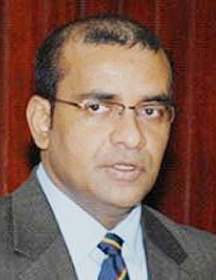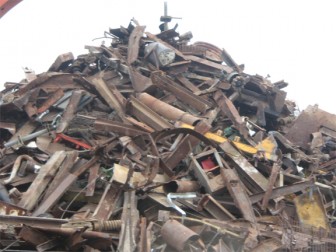Local scrap metal dealers remain hopeful that their efforts to save the industry from extinction will bear some fruit when the government makes its now overdue latest pronouncement on whether or not there are sufficient safeguards in place to remove a ban on exports, which has been in place since April last year.
However, the portents, at least for the immediate future, appear far from appealing.
Since 2007 when the country’s Old Metal Dealers’ Act was amended to give government control of the industry and to take legal action against delinquents in the trade, persistent official pressure has been applied to curb what had become the worsening problem of vandalism and metal theft. A series of partial then complete bans of metal exports has since left the industry in a state of limbo, though these measures have not done a great deal to rein in metal thieves.

The pressure on the local scrap industry has been a direct response to the powerful lobby of the local telecommunication, water and electricity sectors whose installations have had to bear the brunt of raids by pirates seeking out mostly copper, the highest-priced of the metals sold on the local market. Other metals have also been carted for scrapping and selling by the thieves.
The costs of those raids are measured not just in terms of what the thieves take but also – in the case of GT&T – in terms of the ensuing destruction and crippling of telephone services as well as the high replacement and manpower costs associated with restoring telephone communications in the shortest possible time.

GT&T, in which the Government of Guyana is a minority shareholder has, over the past few years, been measuring its losses in tens of millions of dollars and complaints from the company have centred around the impact of the vandalizing of its installations and the attendant need to divert its engineers to restore the damaged installations on its ability to maintain its substantive expansion schedule.
A robust official response has been slow in coming and has only kicked into high gear over the past three to four years. The government, it seemed, had finally come to terms with the realization that the growing global demand for recycled metals with which to feed expanding industrialization in countries like China and India was forcing prices up, offering a compelling incentive to local thieves.
Under pressure from government do their bit to help curb the practice, local scrap dealers have given undertakings which they are really in no position to keep. More than that, their fight to help keep the local industry open is not being helped by clear signals coming from countries both inside and outside the region that metal theft has brought the industry under closer official scrutiny.
In Jamaica, Trinidad and Tobago and the Bahamas, the targeting of scrap dealers in an effort to get at the metal thieves is driven by the widely held belief that in some cases the two are different sides of the same coin. It is the same here in Guyana where, in some cases, thieves have been caught red-handed selling their booty to dealers. Last April’s ban on scrap exports was a direct response to a renewed upsurge in metal theft after a lull of several months.
Unfortunately for the metal dealers, the theft of metals had caught the attention of former president Bharrat Jagdeo himself, who assumed direct control of the situation, imposing the ban on exports and entertaining the lobbyists from the sector. Towards the end of last year, with more than 100 containers of scrap lying idle at wharves and incurring rising storage costs, Jagdeo lifted the ban on exports only long enough for the containers to be placed on vessels and exported before promptly putting the ban back in place. After that the metal dealers commenced another protracted round of negotiations with the government to try to have another 15,000 tonnes of scrap being stored in various yards exported.
The government’s tough policy on metals theft and the attendant consequences for the trade is almost certainly taking its cue from the worsening global reputation which the trade has acquired and the shift towards zero tolerance of the practice in several countries.
In Britain, a draft Metal Theft (Prevention) Bill is currently before the House of Commons, aimed primarily at curbing the theft of cable from railways and bronze plaques from that country’s highly valued war memorials and monuments. The Bill seeks to institute, among other things, a ban on cash transactions involving scrap metal in the hope that the resulting paper trail will act as a deterrent to thieves. When passed into law the legislation allows for delinquents to forfeit all of their holdings of scrap metal and be disqualified from dealing in the trade. Punishment will also encompass prison terms of up to five years.
In the US State of Georgia, legislation designed to curb metal theft is moving through the Senate. The Bill states that “any person who buys or sells regulated metal property in violation of any provision of this article shall be liable to any person who was the victim of a crime involving such regulated metal property for the full value of the regulated metal property and any repairs and related expense necessitated by the crime, plus court costs and reasonable attorney’s fees.” Like the proposed British legislation the Georgia bill also frowns on cash payments.
Metal theft has also come under the national radar in several African countries including Kenya and South Africa where, like in Guyana, the local telecommunications service providers have been among the thieves’ primary targets. In Kenya, metal theft extends to the vandalizing of road signs and the removal of metal rails to protect vehicles from veering off the roads. Up to earlier this month the country’s Roads Minister repeated an earlier call for the banning of the metal trade. In some respects the Kenyan government might have been its own worst enemy. In 2007, the country amended its 1959 Scrap Metal Act to remove the provision of a licence to deal in scrap, a decision that left the industry unchecked.
In South Africa where incidents of metal theft from the telecommunications sector amount to more than 1,000 incidents annually and where the removal of manhole covers has resulted in deaths, not nearly enough appears to have been done to curb the practice.
Efforts in Guyana to seek to regulate what, over the years, have been a largely unregulated industry have met little success; the problem being that operators in the sector range from a relative handful of established businesses to several hundred illegal dealers across the country. The Guyana Scrap Metal Dealers Association (GSMDL) set up a few years ago has been unable to bring the vast majority of dealers under its umbrella, a circumstance that renders its undertakings to work to help bring metal theft under control weak and hollow.
Not that the ban on exports has put an end to the practice of metal theft. High external demand has opened up the illegal cross-border export of metals, a practice in which Asian middlemen are reportedly involved, and weak domestic border controls has meant that exports persist, albeit in smaller quantities.
With the global scrap metal industry now processing around 150 million tonnes of recyclable annually and contributing in excess of US$60 billion to global GDP, Guyana remains a small player in the process. This, in the context of the local association’s efforts to keep the trade alive, does not work to its advantage. The sector suffers from a low and tarnished profile and the prevailing official view appears to be that the industry’s contribution to employment and to the country’s economy is small when compared with the amount of damage that metal theft does to the country’s utility installations.
Internationally, the scrap metal industry is driven by a powerful lobby spearheaded by the World Scrap Metal Congress which, in September will host its 6th gathering of metal recyclers, traders, and industry stakeholders in China; one of the world’s leading importers of scrap. Metal theft will probably appear as an item on the agenda of the Congress, as its stated objective is to strengthen links between Asia’s leading metals manufacturers and dealers in the scrap trade to enable profitable and lasting business partnerships.
Local scrap dealers, meanwhile, are anxiously awaiting the outcome of a promised official assessment of the trade, which Housing and Water Minister Irfaan Ali said some weeks ago was due at the end of January, to determine whether there are now enough safeguards against theft to allow for an end to the ban on exports. The government, it seems, is pinning its hopes on new regulations that require operators in the trade to vouch for their stocks of scrap, though a verification process of that nature is likely to be tedious. Accordingly, hope that there will be a lifting of the export ban in the immediate future is slim, since there is little evidence that the authorities have been able either to bring theft under control or to halt illegal backdoor exports.




